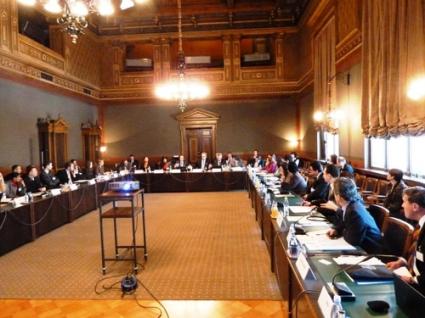Ten millions apostilles per year
The apostille is a method that allows an authentic document issued in a state to be recognized and used in another state, without any need for a complicated and expensive recognition procedure. The convention of 5 October 1961 abolishing the requirement of legalisation for foreign public documents, the "Apostille Convention", is the work of The Hague Conference on Private International Law. It is currently used by ninety-nine states. Among the thirty-nine conventions of the Hague Conference, it is the most widely used worldwide.
The Hague Conference initiated in 2006 a large movement to help the apostille enter the digital age. The e-APP (for e-Apostille Pilot Program) Project is to coordinate the actions of states to develop and harmonize an electronic apostille. It is planned for a period of eighteen months. Spain is a partner in the project. Finland, France and the Czech Republic are associate partners.
It is in this context that this regional seminar was held at the premises of the prestigious States Palace in the centre of Helsinki, welcoming some fifty participants from nineteen countries worldwide. The UIHJ was represented by its first secretary, Mathieu Chardon. The presence of French judicial officers was also noticed as our colleagues are very interested in the project. They were represented by Jean-François Bauvin, Vice-President of the National Chamber of judicial officers of France, and Patrick Safar, Vice-Secretary.
The meeting was chaired by Antii Leinonen, Director of Legislative Affairs of the Ministry of Justice of Finland. The Hague Conference was represented by its First Secretary Christophe Bernasconi.
Antii Leinonen opened the seminar by stating that, despite the very cold weather (about -15 ° C), participation was higher than expected, showing the interest in the apostille and its future. He wished everyone fruitful work indicating that, as is the case for meetings of The Hague Conference recommendations would be made at the end of the meeting. José de la Mata Amaya, Director General of the Modernization of the Administration of Justice (Ministry of Justice of Spain), also welcomed the participants and said that the new system of e-Apostille, soon in force in Spain, would be presented during the day.
Christophe Bernasconi then told how he was happy to see the interest in the apostille and the e-APP Project, as shown by the attendance of many countries to this regional seminar. Then the first secretary of The Hague Conference thanked the Finnish authorities and Spain for their investment in the project. "We will celebrate the 50th anniversary of the apostille Convention. The next fifty years will surely be placed under the sign of the Spanish e-Apostille, "he said. Mr Bernasconi outlined the main principles of the apostille. With this procedure, the competent authority shall issue the certificate directly in a single step. It therefore avoids a lengthy, costly and ultimately unnecessary process to allow an official document of a State to be recognized and used in another state. The apostille convention is growing rapidly. Since 2000, 30% of new countries have ratified it and in the next few weeks, the 100th country should ratify it. According to estimates by The Hague Conference, about ten million Apostilles are issued each year worldwide. In Venezuela or in Colombia for example around 6000 apostilles are set daily in each state. In France, approximately 400 000 apostilles are issued each year. The average cost of an apostille is about 15 euros.
Changing a satisfactory convention
So why changing a satisfactory convention?
In many states, the certificate is fully prepared manually, which generates a rather tedious job. Moreover, it appears that the origin of the document is not always checked before the apostille. In some states, the apostille is simply stapled to the document it concerns, questioning its security. In other countries where many apostilles are issued, the use of a stamp can also pose security issues (theft or fraudulent use of stamps). Another aspect is that it appears that apostilles registers are consulted only in exceptional cases.
With this e-APP Project the apostille should enter the 21st century and dematerialization, without any need to amend the convention or even to annex a protocol to the existing text. Indeed, the convention makes no reference to any particular technology.
The first secretary of The Hague Conference then presented the two main elements composing the e-Apostille: the e-Apostille itself and its registry. The recipient can verify the origin of the e-Apostille on the Internet using a URL or an e-Registry, using the apostille number or date, or obtaining an automatic response, possibly with the ability to view a copy or an image of the apostille itself. The Hague Conference encourages the authorities to certify e-Apostilles through widely used software coupled with a widespread system of electronic signatures.
José de la Mata Amaya presented the progress in this field in his country, where it is actually possible to process the entire process electronically in a simple and secure way.
During the day, several round tables were held on the establishment of an e-Apostille in different countries, what type of information that should appear in the e-Registries, how the e-Apostille could improve service to users, who should be competent, and also on the question of issuing e-Apostilles for electronic or paper documents.
At the end of the meeting, recommendations were prepared and adopted by the seminar participants.
The next workshop on the e-APP Project will be held on 27 May 2011 in Prague (Czech Republic).
For more information, please visit the website of The Hague Conference on Private International Law (
http://www.hcch.net) and its Apostille section:
http://www.hcch.net/index_en.php?act=text.display&tid=37 

